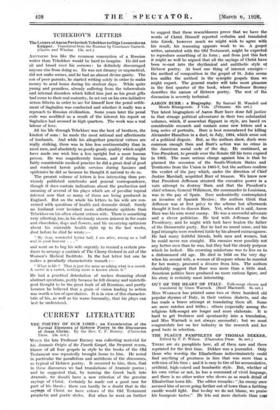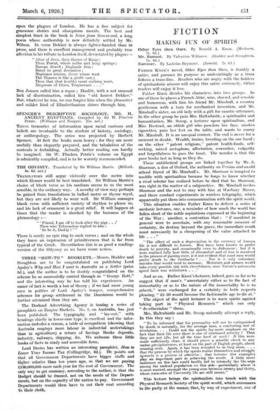THERE are six pamphlets here, all of them rare and
three reprinted for the first time. Dekker was a journalist. Only
those who worship the Elizabethans indiscriminately could find anything of greatness in him that was more than a reflexion of his time ; and it is easy to tire of his accumulative, artificial, high-voiced and bombastic style.. But, whether of his own virtue or not, he has a command of vivid language, and there is no other writer who shows us as much detail of Elizabethan town life. The editor remarks : An enemy once accused him of never going farther out of town than a farthing candle would light. But to-day we do not blame, we praise his bourgeois tastes." He lets out more rhetoric than ever
upon the plagues of London. He has a fine subject for gruesome stories and obsequious morals. The best and simplest tract in the book is News from Graves-end, a long poem whose authorship is now definitely settled by Mr. Wilson. In verse Dekker is always lighter-handed than in prose, and there is excellent management and probably true affection in his tribute to London itself, devastated by plague:—
" Altar of Jove, thou throne of Kings :
Thou. Fownt, where milke and hony springs :
Europa Jewell ; Englands Jem Sister to great Jerusalem Neptunes minion, (bout whose wast The Thames is like a girdle cast, ) Thou that (but health) canst nothing want, Empresse of Cities, Troynovant . . . '
Ben Jonson called him a rogue ; Hazlitt, with a not unusual lack of discrimination, called him " old honest Dekker." But, whatever he was, we can forgive him when the pleasanter and milder kind of Elizabethanism shines through him.







































































 Previous page
Previous page